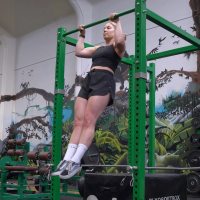
0/6
Lvl 1
3 sec
Lvl 2
6 sec
Lvl 3
9 sec
Lvl 4
12 sec
Boss
15 sec
Master
30 sec
Find a sturdy Pull Up Bar. Begin by standing on a sturdy box or step (if needed) so your chin is over the bar when standing. This initial setup provides a stable platform for executing Pull Up 90 Degree Isometrics. Grip the bar with your palms facing away in a pronated grip, maintaining a shoulder-width distance between your hands. Activate your back muscles with purpose, squeezing the bar as though attempting to bend it in half. Generate tension throughout your lower body by squeezing your feet, thighs, butt, and legs together. Keep your shoulders down, away from your ears. Maintain a proud chest and lift your head towards the sky, creating a seamless straight line from your head to your heels. Once full body tension is achieved, initiate the 90 Degree isometric Pull Up by pointing your toes and extending your legs, lifting your feet off the box or floor. Engage your arms and back muscles to their fullest extent. Lower yourself down until you’re at a 90 degree angle. Hold for desired time. We recommend using your phone timer to help you track how long you’ve held the exercise. Once you have completed the hold safely lower yourself down, before resetting for your next rep and set. Repeat for your target hold time and number of repetitions.
Perform 90 Degree Isometric Pull Ups 2-3 times per week. Perform 3-5 sets of your target times. Start with a manageable hold time and number of reps that challenges you without compromising form. Each week aim to add 1 or more seconds to your hold until you can do a 15 Second 90 Degree Isometric Hold to achieve “Boss” level”. Once you have completed the "Boss" level, we recommend you move on to the next exercise. Come back at any time and attempt to master this exercise.
Bodyweight Pull Ups, while highly effective for building upper body strength, require careful execution to mitigate the risk of injuries, particularly to the shoulders and elbows. It's essential to exercise caution and follow proper technique to ensure a safe and effective training experience. To prevent overloading the joints and minimize the risk of injuries, adopt a gradual progression approach. Focus on mastering proper form before attempting more advanced variations or increasing intensity.
| Date | Result | Notes |
|---|